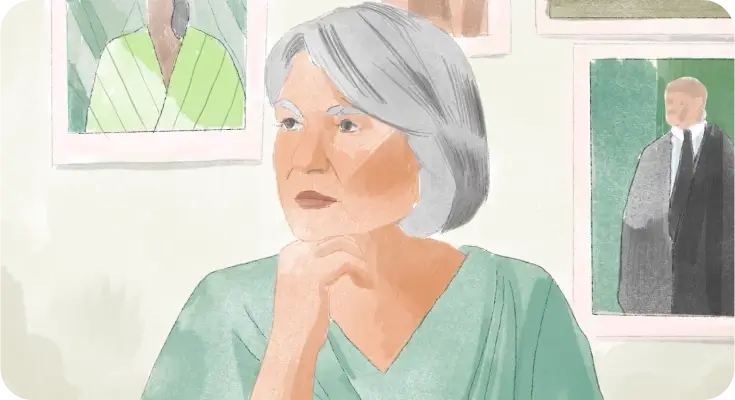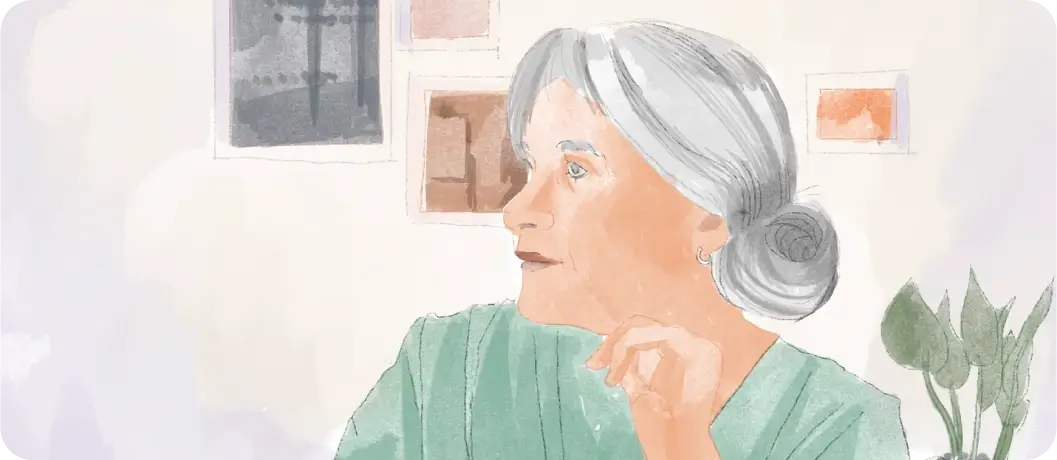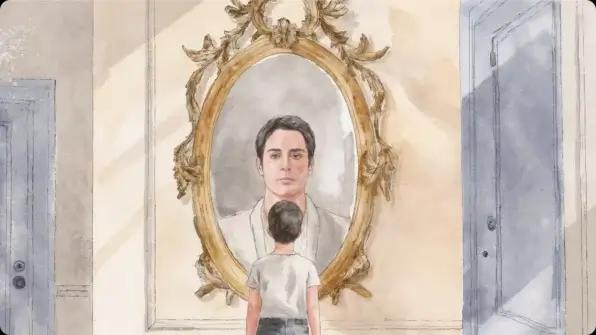Key takeaways
- The trauma anniversary effect refers to a situation where, around the date of a past traumatic event, a person may relive the emotional pain and experience a flood of intense feelings like anxiety, sadness, or anger.
- People feel stressed on a trauma anniversary because our minds store specific triggers from the traumatizing past and “turn the alarm on” when we encounter reminders.
- The main trauma anniversary signs are flashbacks, overwhelming emotions, nightmares, body pain, and avoidance of people, places, and things connected with trauma.
What is a trauma anniversary?
You wake up in a cold sweat, and the echo of the nightmare still clings to you. It’s like a distant scream that won’t quite fade away.
What date is it today? — you glimpse at your phone.
This happened years ago! Why do I still feel so trapped in the past, as if the pain is unhealed?
A trauma anniversary often feels similar.
This usually happens around a significant traumatic event that has left emotional scars. It can be the anniversary of a death, breakup or divorce, life-threatening injury, or even significant life changes.
Some other events that may cause trauma anniversary effect are:
- Childhood trauma
- Physical, financial, or emotional abuse
- Serious illness
- Car accidents
- Witnessing a traumatic event
- Sexual assault or violence, etc.
Note: Not every person who has experienced a difficult life event may feel this way. Some people are more resilient and may never feel this way, whereas others may experience this along with other difficulties.
What do people feel on a trauma anniversary?
This can vary from person to person, as all of us use different ways to cope. The most common anniversary reactions are grief and sadness, while some people also feel anxious, restless, depressed, or even angry.
However, sometimes, a trauma anniversary may give us an opportunity to get stronger and feel better. For example, you can visit a support group, discuss your feelings with your therapist, or commemorate this day in other ways.
Besides emotional wounds and unexpected feelings, you may find yourself experiencing tension or fatigue. Moreover, many people might have headaches, stomachaches, or even changes in appetite as their body reacts to the anniversary of the trauma.
These physical symptoms are often manifestations of the stress and anxiety that resurface during these difficult times.
“I feel emotional and physical symptoms of the trauma anniversary effect, but I don’t remember any traumatizing events happening around this time of the year.” We asked Enna Sanghvi, MA, what else could be causing similar feelings, “There are multiple reasons why you may have emotional or physical signs during a specific time of the year. One simple explanation is that you don’t remember the distressing event. Another reason could be that you are possibly going through a stressful experience presently and this is bringing on said emotional or physical signs. Specific to post-traumatic stress disorder — sometimes people start exhibiting symptoms years after the event, prior to which, they were functioning in their daily life. There is still an awful lot we don’t know about trauma processing. Furthermore, there is conflicting/contradictory research out there. So, if you are experiencing emotional or physical signs, it might be more individualistic.”
Why do people feel stressed on the anniversary of a traumatic event?
Quite often, the trauma anniversary effect means that you haven’t fully processed the experience. It’s like reopening old wounds, making the past feel close and painful again.
The date acts as a trigger, bringing back the emotional weight and making it hard to escape the ghosts of the trauma.
But why does it happen? The clue hides in the way our brains work.
In a nutshell, our brains want to protect us from repeating some painful and dangerous experiences. Because of this, they keep traumatic memories on the top, ready to arise before something similar is about to happen.
But memories are more than just pictures of the trauma. They might also hold information about the rain outside, the smell of your favorite pumpkin pie, or even the sound of an unexpected phone call from your mum early in the morning.
What’s more, sometimes memories may not be reliable. You can forget important details, misremember something, or even completely alter the sequence of events. When we can’t recall the details, our brains tend to fill in the missing gaps with fiction or other memories.
Once you experience too many triggers at once, the brain turns on the alarm system. When can it happen? Quite often, on a trauma anniversary.
You might not focus on the date purposefully, but your brain may dwell on some similarities anyway. When so many memories are tied up, the entire season or date can evoke strong reactions.
This is why some people who witnessed the 9/11 terrorist act may feel anxious and restless every September. And this can be the reason why someone who experienced a significant loss during the holidays might feel overwhelmed each year when the season rolls around.
Can I experience a trauma anniversary effect on other days?
Interestingly, yes.
As we’ve already mentioned, trauma anniversary signs might stem from past memories connected with specific triggers.
You can start being nervous weeks or even months before the anniversary of a traumatic event. Moreover, this feeling may last sometime after the anniversary.
For example, you got into a car accident during a severe snowstorm. Now, every time winter starts and snow blankets the ground, a wave of anxiety hits, as if your body is whispering, “Remember?”
Or think about people who feel birthday depression — what should be a joyful day brings a sense of sadness or loss. Childhood trauma and painful experiences from the past make their lost inner child feel afraid and restless.

PTSD symptoms VS. trauma anniversary
While at first sight, PTSD and a trauma anniversary effect might seem pretty similar, it’s essential to note their differences.
Post-traumatic stress disorder (PTSD) is a mental health condition that people develop after a severe traumatizing event. The symptoms of PTSD may start immediately, but in some cases, they develop years after.
To get diagnosed with PTSD, a person should experience the symptoms for longer than 1 month. Moreover, their manifestations should cause major problems in some aspects of daily life.
For an adult to receive a PTSD diagnosis, they must experience all of the following groups of symptoms for a minimum of one month:
- At least one symptom related to re-experiencing the event (flashbacks, distressing thoughts, recurring memories, nightmares, physical issues)
- At least one symptom of avoidance (avoiding thoughts, places, objects, sounds, smells, etc, connected to the event)
- At least two symptoms affecting cognition and mood (persistent negative thoughts, distorted sense of blame, loss of interest in activities, difficulty experiencing positive emotions)
- A minimum of two arousal and reactivity symptoms (problems with concentration, aggressive outbursts, engaging in risky behavior, feeling tense)
In contrast to the trauma anniversary effect, post-traumatic stress disorder symptoms are consistent and can get worse over time. Moreover, PTSD is a more chronic condition that isn’t limited in time and requires longer-term management and care.
What about trauma anniversary “symptoms”?
In fact, we can’t call them “symptoms” but rather manifestations of the trauma anniversary effect. While they might overlap with PTSD symptoms, there’s a noticeable difference.
Trauma anniversary effects are short-lived, usually happening around the date of the original event. While they can feel intense, the big difference from PTSD symptoms is that they tend to fade after the anniversary passes.
It’s more of a temporary reaction than something long-lasting like post-traumatic stress disorder. What’s more, it’s enough to face one of them to say that you feel the outcomes of a trauma anniversary.
| Aspect | PTSD | Trauma anniversary |
| Duration | Can be long-term or chronic without treatment | Usually happens annually, but the intensity of its manifestations may vary each year |
| Main triggers | Everything that reminds us about traumatic events (people, places, things, etc.) | The specific date or time of year when the traumatic event happened |
| How is it linked to trauma? | It’s a direct result of trauma with persistent symptoms. | It’s a significant reminder of trauma that temporarily activates trauma-related feelings. |
Are these phenomena related?
A little bit. Some people with PTSD may experience more severe symptoms on the anniversary of trauma. However, it isn’t necessary, and the trauma anniversary effect isn’t considered a diagnostic criterion for post-traumatic stress disorder in DSM-5.
So, if you feel turbulent around a trauma anniversary, this doesn’t necessarily mean that you have PTSD.
7 signs that you may experience outcomes of the anniversary of the traumatic event
Around the date of the event, many people re-experience the intensity of the original trauma. This often leads to emotional and physical responses that mirror the past pain.
It’s important to note that there’s no “typical” reaction to a trauma anniversary. However, anniversary reactions often make PTSD symptoms more intense.
What are the signs you might experience the anniversary effect? Let’s find out.
1. Re-experiencing the event
Sarah survived a terrible car crash during a rainstorm. On the accident anniversary, she wakes up to the sound of rain against her window.
As she drives to work, an uneasy feeling starts to creep in. The rain on her windshield starts to blur her vision. In her mind, she’s no longer driving to work—she’s back in that car on that day.
Her heart races, and even though she’s safe now, it feels like the crash is happening all over again.
On the anniversary of trauma, people may experience realistic flashbacks of past feelings, smells, sounds, and even body responses. You might even feel that the event is happening right now, especially when getting into similar situations.
2. Anger or frustration
David lost his father two years ago. As the anniversary of this date gets closer, he feels tension rising.
One afternoon, while scrolling through social media, he notices a post from a friend. He has posted a photo of his dad with a heartfelt message congratulating him on his birthday.
“What do you call the anniversary of a death?” David mutters to himself. “It isn’t a remembrance day but rather a day of pain and struggle!”
The man is flipped out. “Why do others deserve to celebrate while the only thing I can do is wallow in my grief?!”
Some things may feel unfair for people living with unhealed trauma. And it’s really common to get angry or frustrated, especially around the anniversary of a traumatic event.
3. Anxiety
Julia had been working as a secretary for over 4 years until last year she got fired without any clear reason. Living in a rented apartment with a toddler, she lacked money even to buy a new skirt.
After going through debt, hard times, and many sleepless nights, she is now finally working at a well-paid job. But once the trauma anniversary gets closer, Julia feels on the edge.
“What if I got fired again? How will I handle everything?” — an overwhelming anxiety washes over her, gripping her chest and making it hard to breathe.
Being restless, anxious, or overly sensitive on the anniversary of trauma is a normal reaction. Some people might worry that it will happen again, while others unconsciously react to stress this way.
4. Body pain
“Why is my stomach aches? Wait… the feeling is the same as it was on the day when…”
Ben felt shivers all over his body. 5 years ago, he experienced a complicated operation that left him not only physically scarred but emotionally shaken.
Since then, hospital smells give him severe flashbacks, while in periods of stress, he feels that pain in his stomach.
The same feelings as ghosts from the past may come back as a part of the trauma anniversary effect. Moreover, people can experience increased heart rate, difficulty breathing, or other manifestations of the fight-or-flight response to specific triggers.
5. Feelings of sadness, guilt, and shame
“I’m such a stupid person! How… how could I let him do this to me?”
Kate broke up with Joe 2 years ago. While everyone thought they were a happy family, Kate struggled every day. Joe seemed to be smart and caring, but in reality, he was abusive and overprotective.
After years of constant arguments, financial and emotional abuse, and even moments that made her question her worth, Kate finally found the strength to leave.
But still, when the anniversary of their breakup approaches, she feels guilty and ashamed that she hasn’t stood up for herself sooner.
Do you face the question, “Why am I so sad and depressed for no reason?” Maybe it’s because the trauma anniversary is around. You might live with different feelings during this period, and all of them are OK.
6. Nightmares
Vicky wakes up every night for over two weeks. Every dream, every attempt to fall asleep and rest, finishes with her waking up after experiencing one more parents’ argument.
She hasn’t lived with her mum and stepfather for over seven years, but still remembers every time she cowered under her blankets, trying to shut out the sound of their shouting.
Their constant arguments and reactive emotional outbursts left a long-lasting scar on her soul, and she still lives with the symptoms of complex trauma.
Tomorrow is the anniversary of their marriage. The day when this nightmare started for 11-year-old Vicky.
The anniversary of a traumatic event can make us feel bad. This way, our brain processes past experiences and protects us from getting into similar situations.
7. Avoidance
Mike would stay here forever. OK, maybe not forever, but at least for the next week.
While everyone around is preparing for the 4th of July, the anniversary of the death of his dog is getting closer.
He doesn’t want to see happy faces and hear the fireworks. He experienced it last year when sitting at a vet clinic, hoping his dog would be fine. No more celebrations!
A desire to avoid anything that reminds you about a traumatizing event is normal. Some people find it difficult to visit those places, while others start hating specific songs or smells. It’s a way of protecting themselves from feelings that can feel overwhelming.
My loved one experiences an anniversary of trauma. How can I help?
When your close friend or a family member handles the symptoms of a trauma anniversary, your rush to step in and help is natural. Still, sometimes, it may be difficult to understand where to start.
Here are a few simple things you can do to help your loved one overcome the trauma anniversary effect.
- Let them know that you’re here to help
- Acknowledge that any emotion is normal
- Listen without judgment
- Make plans for the day to distract them
- Do something meaningful together
- Respect their boundaries
- Suggest professional support
“What coping strategies are the most effective for a person to support themselves on a trauma anniversary?” Enna Sanghvi, MA, shared the insights, “This varies from person to person. A coping strategy that works for one person may not work for another. It is important to have a toolbox of multiple coping strategies that one can choose from when needed. Additionally, it is important to work on building your coping skills through practice (especially during times when you are not in a crisis) because the more you practice, the more naturally it will come to you.”
How long does the anniversary effect last, and when should I seek help?
“Sometimes the worst part about trauma was not going through it. It was the aftermath, when you were free. And you are obsessed about what would have happened if you hadn’t gotten out.” — J.R. Ward, Prisoner of Night.
From dozens of trauma anniversary quotes, this one might feel the most relatable for some people.
After experiencing a traumatizing event, you may dwell on what-ifs and other thoughts that swirl around in your mind, making it hard to move forward.
Does time heal? If you’re still reliving the same painful emotions years later, it might feel like time alone isn’t enough.
So, what should you do? It may be helpful to consider treatment.
The trauma anniversary effect means that past experiences still influence your present. This unhealed trauma can stay with you for decades. So, it’s much better to reach out to a therapist and seek support to reclaim peace and make the aftermath more manageable.
Disclaimer
This article is for general informative and self-discovery purposes only. It should not replace expert guidance from professionals.
Any action you take in response to the information in this article, whether directly or indirectly, is solely your responsibility and is done at your own risk. Breeze content team and its mental health experts disclaim any liability, loss, or risk, personal, professional, or otherwise, which may result from the use and/or application of any content.
Always consult your doctor or other certified health practitioner with any medical questions or concerns
Breeze articles exclusively cite trusted sources, such as academic research institutions and medical associations, including research and studies from PubMed, ResearchGate, or similar databases. Examine our subject-matter editors and editorial process to see how we verify facts and maintain the accuracy, reliability, and trustworthiness of our material.
Was this article helpful?








